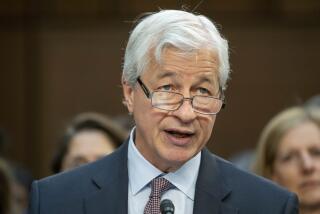JPMorgan’s $2-billion loss renews calls for tough financial rules
WASHINGTON — The $2-billion trading loss at JPMorgan Chase & Co. rekindled fears about the stunning risks still being taken on Wall Street, reviving demands for tougher financial rules and calls for the nation’s biggest banks to be broken up.
U.S. and British regulators said they were investigating the huge loss in a trading portfolio at JPMorgan. The bank saw its stock tumble 9% on Friday, the day after it disclosed that traders in New York and London had made misguided investments in complex derivatives in an effort to hedge against losses.
“I think it’s safe to say that all the regulators are focused on this,” Mary Schapiro, chairwoman of the Securities and Exchange Commission, told reporters.
JPMorgan Chief Executive Jamie Dimon was contrite, saying the regulatory scrutiny was to be expected.
“We know we were sloppy. We know we were stupid. We know there was bad judgment,” Dimon told NBC’s “Meet the Press” in an interview to be broadcast Sunday. “Of course regulators should look at something like this. That’s their job.… They will come to their own conclusions. But we intend to fix it, learn from it and be a better company when it’s done.”
The disclosure sent most major bank stocks lower and contributed to a modest 34-point drop in the Dow Jones industrial average. But many on Wall Street believe the fallout has just begun and are bracing for more government restrictions on banks.
The self-inflicted wound comes as Wall Street tries to fend off tough new regulations, including the so-called Volcker Rule intended to stop banks from taking excessive risks — even with their own money — in the pursuit of profits.
“The argument that financial institutions do not need the new rules to help them avoid the irresponsible actions that led to the crisis of 2008 is at least $2 billion harder to make today,” said Rep. Barney Frank (D-Mass.), a lead author of the financial reform law.
Dimon was Wall Street’s most visible opponent of stricter federal oversight, and many believe his bank’s spectacular trading loss effectively takes him out of that picture. Dubbed by some the “king of Wall Street,” Dimon had a reputation burnished by the relative ease with which JPMorgan navigated the crisis compared withCitigroup Inc.,Bank of America Corp.,Goldman Sachs Group Inc.and other large financial institutions.
“This event has really tarnished his reputation and especially his credibility,” said Mark Williams, a former Federal Reserve bank examiner who teaches at the Boston University School of Management.
The $2-billion loss — which JPMorgan said could grow — was the result of a complicated trading strategy that involved derivatives. These investments, which billionaire investor Warren Buffett once called “weapons of mass financial destruction,” are valued based on the prices of other securities and assets.
The bank did not provide specific details about what caused the losses; however, they appeared to stem from derivatives tied to usually stable corporate bonds. JPMorgan bet that prices would move in one direction, and it lost when they moved the other way.
Supporters of tougher regulations took shots at Dimon on Friday.
Noting a recent estimate by JPMorgan that complying with the financial reform law would cost the bank $400 million to $600 million, Frank said the bank, “entirely without any help from the government, has lost, in this one set of transactions, five times the amount they claim financial regulation is costing them.”
Rep. Brad Sherman (D-Sherman Oaks) said Dimon had become a prime example of the need for tougher oversight. One of several lawmakers who have introduced legislation to break up the largest banks, Sherman said JPMorgan’s loss gave momentum to those efforts. “You’re talking about going up a steep hill, but this puts some gas in the tank,” he said.
As investors punished JPMorgan on Friday, Fitch Ratings downgraded the bank’s long-term debt to A+ from AA- and put it on a “negative watch.”
Fitch said it viewed JPMorgan’s $2-billion loss as manageable, especially considering the bank reported a $5.4-billion first-quarter profit. However, the ratings company said “the magnitude of the loss and ongoing nature of these positions implies a lack of liquidity.”
An Obama administration official who was not authorized to speak publicly said JPMorgan’s problems underscored the need to keep pushing to implement the financial reform law.
The focus Friday was on the Volcker Rule, one of the law’s most controversial provisions. Still being formulated, the rule would limit trading by banks for their own accounts.
The senators behind the Volcker Rule warned that draft regulations included a loophole that would have permitted the investments that led to JPMorgan’s $2-billion trading loss.
“That loophole should be closed,” said Sen. Carl Levin (D-Mich.). Levin and Sen. Jeff Merkley (D-Ore.), who co-wrote the Volcker Rule, said the rule was intended to prevent the type of broad, risky bets that led to JPMorgan’s huge loss.
Dimon and other industry officials have lobbied regulators heavily to loosen the restrictions.
“Wall Street is spending a fortune to try to water down the language of this law,” Levin said.
Proposed regulations drafted by the Federal Reserve and other agencies before a July deadline would have allowed the bet that led to JPMorgan’s trading loss because the bank characterized it as a hedge, Levin and Merkley said.
“This is not a hedge as we defined it in the law,” Levin said.
As written, the Volcker Rule clearly prohibits broad hedging to offset risks from a portfolio or the direction of the economy, Levin and Merkley said. Only hedges tied to specific assets are supposed to be allowed.
In February, the senators wrote a lengthy letter to regulators warning that “banks could easily use portfolio-based hedging to mask proprietary trading.”
Regulators should heed the example from JPMorgan’s huge trading loss to close the loophole, Levin and Merkley said.
Williams, the former Fed bank examiner, agreed.
“It wasn’t a hedge,” Williams said. “They took a bet. They swung for the fence. They lost.”
Puzzanghera reported from Washington and Tangel from New York.







